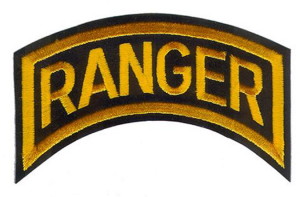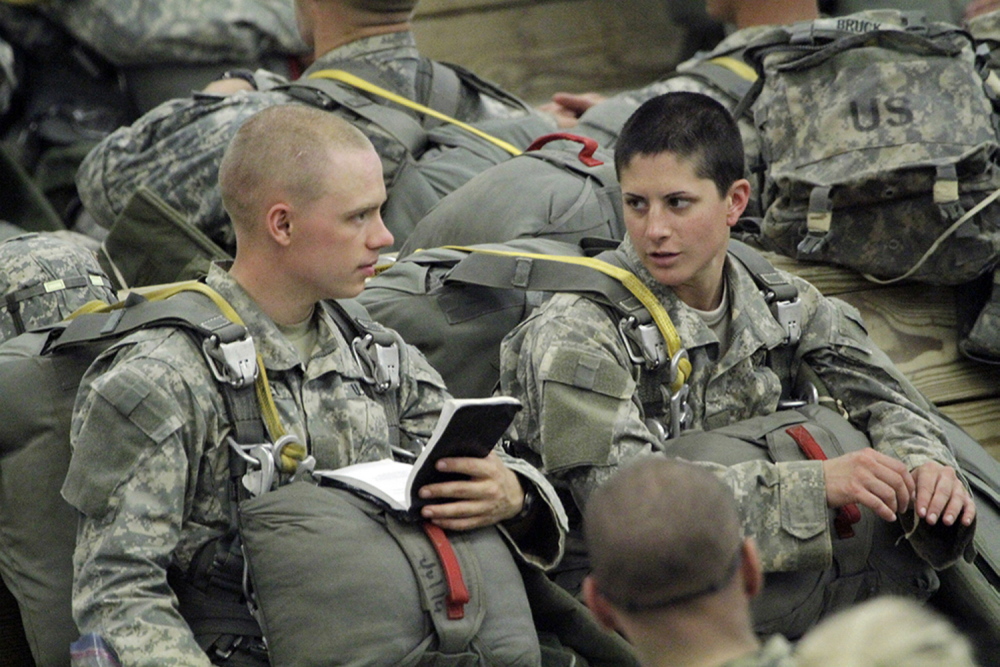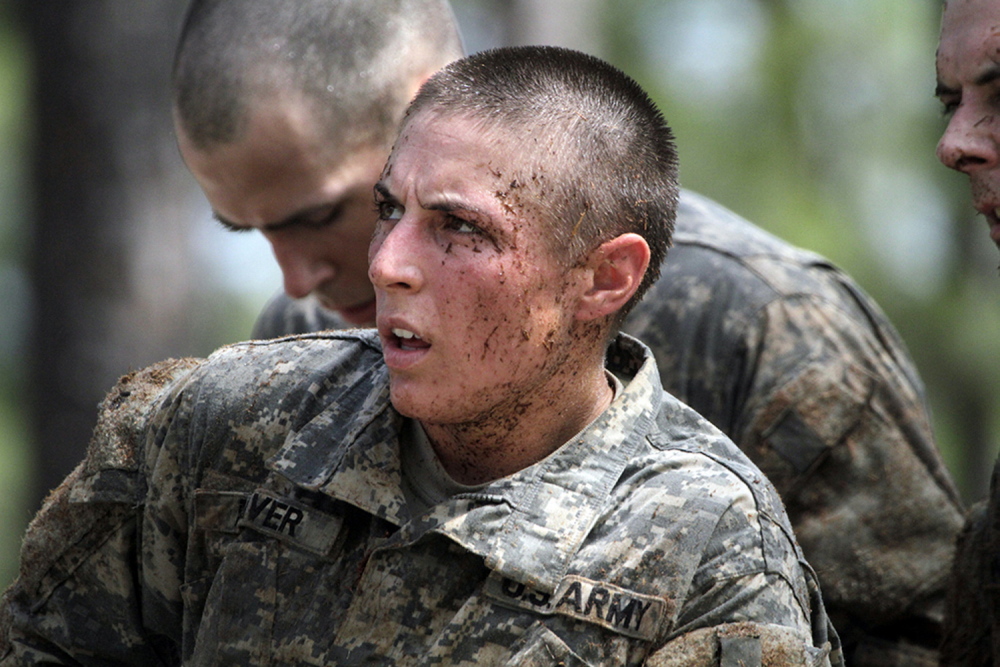Now that two women have graduated from the legendary Ranger school, can we get back to reality?
Yes, it is impressive that these women conquered the Army’s 62-day equivalent of the men’s Hunger Games, crawling, walking and running over mountains, into the air and through swamps.
Yes, one of them even scaled up a 60-foot sheer rock cliff faster than the men did, stunning one military observer who said 1st Lt. Kristen Griest showed no muscle fatigue, no shaking as she powered up the mountain.
And yes, they had to do everything the men did, carrying soldiers on their backs, swimming through swamps loaded down with gear, marching 10 miles, then running two more. With little food and barely any sleep. While instructors yelled at them in the sweltering heat of July and August.
The two women — Griest and 1st Lt. Shaye Haver — will now get to wear that little black and yellow patch that military guys fetishize and worship, the Ranger tab.
The reality? Women have been serving alongside Ranger units, and dying with them, for years now. The Army just didn’t let them train for it before.
Using the graduation of these two women to justify women’s participation in combat roles is a little like making Bill Gates or Mark Zuckerberg go back and get their college degrees to prove they can make it in the marketplace.
Women have been doing this stuff, with or without the little tab.
“The public may not realize it, but over 1,000 women have been killed or injured” in Iraq and Afghanistan, said Col. Ellen Haring, one of two Army Reserve officers who filed a first-of-its-kind lawsuit three years ago against the Defense Department and the Army for barring women from certain combat units and other jobs solely on the basis of their gender.
About 200 of those women Haring mentions were killed in combat.
The most famous one is 1st Lt. Ashley White, the humble girl-next-door from Ohio who didn’t tell her family what she was doing before she was killed in Afghanistan by a daisy chain IED set off by one of the Rangers she was there to “support.”
Her parents thought she was out there setting up medical tents and taking care of women and children. Instead, she was embedded with an elite special ops team, working side-by-side with them on raids, jumping out of helicopters, frisking and interrogating women in burqas.
The unit was created in 2010, when the military began recruiting female soldiers who wanted to be deployed with the Army’s 75th Ranger Regiment.
So turns out it was fine to have women there all along. Which makes no sense, because at the same time they were recruiting women to serve right alongside the Rangers, women were banned from entering Ranger School.
That’s like forbidding a certain group of people from going to medical school but then being totally cool with having them do surgeries.
Haring wanted to go to Ranger School back when she graduated from West Point and was “all gung-ho.” Slam, another door closed to her face.
For 30 years, she slugged it out, soaring in all her jobs but hitting that glass ceiling year after year. Because more than a quarter million jobs in the military were closed to her simply because of her XX chromosomes.
Less than half a year after she filed her lawsuit, then-Defense Secretary Leon E. Panetta lifted the ban on women serving in combat roles.
Even so, about 200,000 jobs remain closed to women, and the fight continues, said Haring, who lives in Northern Virginia. I talked to her as she was heading to Friday’s Ranger School graduation to celebrate the milestone.
But Haring isn’t sure if there will be a sea change in the military now that two women have proved they can get a degree from Macho U. Navy SEAL school may be the next to let women hang with the guys.
“It’s huge” that the Ranger School opened up and the women proved the naysayers wrong, she said. “I also know it’s evolutionary, and it’s hopeful. We’ll see how this plays out in the next few weeks.”
There has been plenty of Internet hate leveled toward the 19 women who entered the school, and the two who graduated.
Some meatheads gleefully predicted the women would fail. They bloviated on a woman’s ability to carry an injured comrade off the battlefield.
Others moaned about lowered standards.
“If you look at the data,” Haring said, “this is the highest failure rate the school had.”
What she’s saying is that the standards weren’t lowered, but in fact, the instructors were harder on this class than they’d ever been before.
And others worried that women just couldn’t handle the pain, the stress, the emotional strain they way men do. See: man cold vs. childbirth.
But the declarations I love best are from the Rangers who have been there, who know the Ranger course, who know they needed to impress both instructors and peers to graduate and know you can’t cheat your way into the tab. They have openly saluted the women.
“The two women have proved that sex doesn’t matter at Ranger School — only survival,” wrote Adrian Bonenberger, a 2006 graduate of Ranger School who said his springtime courses, where most of his jumps were canceled because of thunderstorms and the weather was mild, were decidedly easier than what Griest and Haver just endured.
Nick Palmisciano, a West Point and Ranger School graduate, posted this on the American Women Veteran’s site:
“I’m blown away, because I know how hard that school is. I know how much it takes out of you. I know how many times you feel like you might not make it, and you have to make the decision to just keep putting one foot in front of the other. I know how many times I wanted to quit. And I also know that these two ladies are not men. They don’t have my frame. They don’t have my muscle mass. They don’t have my testosterone levels. Which means they hurt more than I did. Which means they had to dig deeper than I did. And they made it anyway. And they suffered for four months to do it.”
Indeed, Ranger School isn’t all about brawn, bulk and hairy chests. It is about endurance, grit, leadership, skills, resilience and never, ever quitting. And those are things that some women — just like some men — are thrillingly capable of.
Petula Dvorak is a columnist for The Washington Post.
Send questions/comments to the editors.






Success. Please wait for the page to reload. If the page does not reload within 5 seconds, please refresh the page.
Enter your email and password to access comments.
Hi, to comment on stories you must . This profile is in addition to your subscription and website login.
Already have a commenting profile? .
Invalid username/password.
Please check your email to confirm and complete your registration.
Only subscribers are eligible to post comments. Please subscribe or login first for digital access. Here’s why.
Use the form below to reset your password. When you've submitted your account email, we will send an email with a reset code.